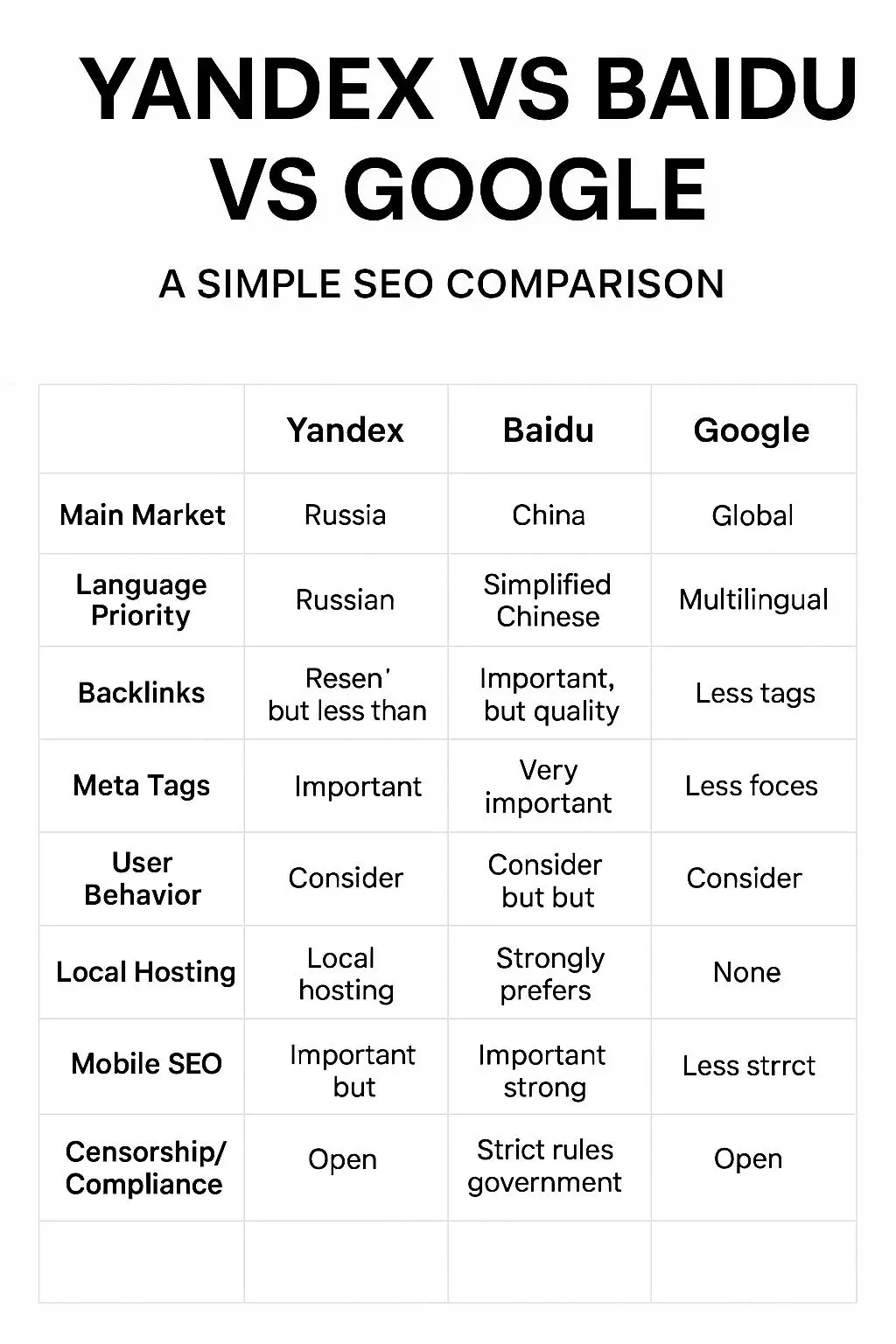Table of Contents

When we talk about search engines, most people immediately think of Google. It dominates the global market with over 90% of searches worldwide. But in countries like Russia and China, Google is not the first choice. Instead, Yandex rules in Russia, while Baidu is the leading search engine in China.
If you’re into international SEO or planning to expand your business globally, it’s important to understand how these three platforms work differently. Let’s break it down in a way that’s easy to understand.
Google SEO Basics
Google is the global leader because it focuses on user experience and search intent. Instead of only looking at keywords, Google tries to understand the meaning behind a search.
What Google Values Most:
- Content quality: Long, detailed, and well-structured articles rank better.
- Backlinks: Links from trusted, relevant websites matter a lot.
- Mobile-first indexing: Websites must be mobile-friendly.
- Page speed: A fast-loading website is rewarded.
- E-A-T (Expertise, Authoritativeness, Trustworthiness): Google ranks content written by experts more highly.
In short, Google SEO is all about providing value to users and creating a smooth browsing experience.
Yandex SEO Basics
Yandex is Russia’s largest search engine, with a big share of the market. Unlike Google, Yandex works a little differently because it’s built for Russian users and their unique search behavior.
What Yandex Values Most:
- Local relevance: Yandex strongly favors Russian websites with a .ru domain and Russian-language content.
- User behavior: Yandex looks closely at how users interact with your site—if they stay longer, click more, or return, it helps your ranking.
- Meta tags: Yandex pays more attention to titles and meta descriptions than Google does.
- Content freshness: Regularly updated content is rewarded.
- Backlinks: Yandex is less dependent on backlinks compared to Google.
Simply put, Yandex SEO is user-behavior driven and very location-specific.
Baidu SEO Basics
Baidu dominates China’s search engine market. Since China has strict internet regulations, Baidu works differently from Google and Yandex.
What Baidu Values Most:
- Chinese language content: To rank on Baidu, your content must be in Simplified Chinese.
- Local hosting: Websites hosted in China or with a Chinese domain (.cn) rank better.
- Meta tags: Similar to Yandex, Baidu still values meta keywords and descriptions.
- Censorship compliance: Content must follow government rules; restricted topics will not rank.
- Backlinks: Baidu values backlinks, but spammy link-building is risky and penalized.
- Loading speed: Since many foreign websites load slowly in China, Baidu prefers local, fast-loading sites.
In simple words, Baidu SEO is all about being local, compliant, and fast.
Key Differences Between Google, Yandex, and Baidu
Let’s put them side by side:
| Factor | Yandex | Baidu | |
|---|---|---|---|
| Main Market | Global | Russia | China |
| Language Priority | Multilingual | Russian | Simplified Chinese |
| Backlinks | Very important | Less important | Important but quality-focused |
| Meta Tags | Less important | Important | Very important |
| User Behavior | Considered but not main factor | Strong ranking factor | Considered but secondary |
| Local Hosting | Not required | Preferred in Russia | Strongly preferred in China |
| Mobile SEO | Crucial (mobile-first indexing) | Important but less strict | Important for ranking |
| Censorship/Compliance | Open | No strict censorship | Strict rules, government compliance needed |
Why This Matters for Businesses
If you only target international markets, focusing on Google is enough. But if you want to grow in Russia or China, you must adjust your SEO strategy.
- In Russia, Yandex is king. Having Russian-language content, a local domain, and a strong focus on user behavior is key.
- In China, Baidu dominates. Without a Chinese domain, Simplified Chinese content, and compliance with regulations, ranking is nearly impossible.
- Globally, Google will remain your primary focus, but ignoring Yandex and Baidu could mean missing out on huge opportunities.
Tips to Optimize for All Three
- Use local domains – .ru for Russia, .cn for China, and .com or .org for global.
- Create content in native languages – Russian for Yandex, Simplified Chinese for Baidu.
- Pay attention to meta tags – Yandex and Baidu still value them a lot.
- Improve user experience – Fast loading, mobile-friendly, and easy navigation help across all.
- Respect local laws – Especially for Baidu, where compliance is non-negotiable.
- Focus on content freshness – Updating blogs regularly works well for Yandex and Google.
Final Thoughts
Google, Yandex, and Baidu may all be search engines, but they don’t play by the same rules.
- Google SEO focuses on search intent, content quality, and backlinks.
- Yandex SEO is about local relevance and user behavior.
- Baidu SEO is driven by language, local hosting, and government compliance.
If your business is aiming to go global, it’s not enough to just master Google. You need to adapt to Yandex for Russia and Baidu for China to reach new audiences effectively. Best digital marketing institute in delhi
The golden rule? Think global, but act local—adjust your SEO strategy for each search engine to maximize visibility and success.


